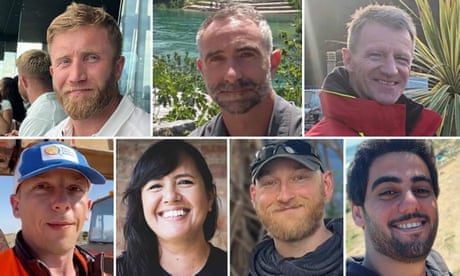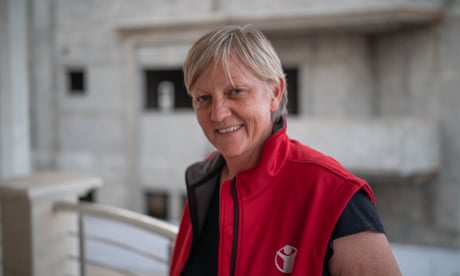Extract from The Guardian
Two gut punches have changed the tone of Australia’s public engagement with Israel.
The first came on Tuesday morning when a terrible image featuring a bloodied Australian passport appeared on social media and made its way rapidly into the offices of prime minister Anthony Albanese and foreign minister Penny Wong.
The second landed on Tuesday night as Israeli prime minister Benjamin Netanyahu tried to explain away the triple Israeli missile strike that had killed Australian aid worker Zomi Frankcom and six of her colleagues in Gaza, saying: “This happens in wartime.”
Albanese described that response as “not good enough”. How he worded it in Wednesday morning’s lengthy phone call with Netanyahu has not been disclosed.
By Friday, education minister Jason Clare was wilfully misquoting Netanyahu on breakfast television to reflect how his comments had been received: “It’s not good enough just to say ‘shit happens’.”
Senior Australian ministers were – and are – appalled at Netanyahu’s language, tone and judgment in thinking that was an adequate response, even preliminarily, to his own defence force targeting the citizens of nations which have defended Israel in launching a brutal war in Gaza to avenge last year’s 7 October Hamas terrorist attack.
Their view only hardened as an Israeli spokesperson rolled out a series of purported explanations and mitigations, including that it was dark, there was confusion, “war is hell, war is foggy” and the strikes were “a grave mistake”.
They were certainly a grave miscalculation.
Frankcom and six other international aid workers died when an Israeli drone fired three missiles at their convoy, one for each vehicle. The strikes were not in rapid succession but separated by time and distance as the Israeli Defence Force picked off the moving vehicles bearing aid agency World Central Kitchen’s logo, one by one.
Netanyahu called it “a tragic case” of “unintentionally hitting innocent people” and that Israel would “do everything so that this thing does not happen again”.
But that is little assurance because “this thing” has happened before. Wong came to Guardian Australia’s podcast interview on Thursday armed with facts about the incident being “not an isolated one”. She noted that 196 aid workers had already been killed in Gaza, that those workers were protected under international law, and that Israel had “an obligation” to ensure they were safe.
As a result of the strikes which killed one Palestinian, one Pole, three Britons, and a Canadian-American dual national, along with Zomi Frankcom, some things that used to be said only privately to Israel about how it’s waging this war are now being said in public.
The deaths may not have increased these countries’ already-extreme concern about the humanitarian toll in Gaza, but Israel’s undeniable failure to uphold its legal obligations has given them leverage to be much more direct about it.
US president Joe Biden told Netanyahu that future US support was contingent on Israel taking “specific, concrete and measurable steps” to address not only the safety of aid workers but the harm to civilians in Gaza and the humanitarian suffering the conflict is inflicting overall. He said there must be an “immediate ceasefire”.
Wong has also dispensed with the usual nuance, telling Guardian Australia that the airstrikes were not “something that can be brushed aside” and calling Netanyahu’s comments “deeply insensitive”. On Friday night, she issued a further short, blunt statement.
“The information Israel has provided on its investigation hasn’t yet satisfied our expectations,” she said, affirming that the Australian government was “alarmed” by Netanyahu’s initial remarks and Israel’s responses since.
“These responses suggest the gravity of the death of seven humanitarian workers is yet to be appreciated by the Israeli government.”
In other words, they don’t get it.
There are some disturbing contradictions in Israel’s responses to date.
While calling the missile strikes a mistake, it is also saying that sometimes there are terrorists in the convoys. That implies that sometimes, regardless of what aid organisations say about who is travelling and why, and regardless of the guarantees Israel gives of safe passage in return, someone, somewhere inside the Israeli system decides to strike anyway.
If the details of these agreements struck between aid organisations and the IDF’s liaison officers – which are life-and-death for those who will be travelling – are not communicated and upheld, they are worthless.
On Friday, ABC Radio National’s Sally Sara asked IDF spokesman Lt Col Peter Lerner whether launching three separate strikes on clearly marked aid vehicles conformed with the IDF’s rules of engagement.
At first, Lerner said “hypothesising” would be irresponsible. But then he added: “Each target has a specific identification, a specific individual, a specific component of Hamas or Palestinian Islamic Jihad infrastructure that can be taken out. So they are lawful targets whether they are three vehicles, one vehicle or walking in the street.”
That sounds like very careful consideration and planning. It doesn’t sound like an approach that leaves much room for mistakes. And yet mistakes keep being made.
So, either Israel cannot control its own forces, or it disbelieves and disregards the information aid organisations are giving about who is travelling in these convoys and what they are doing.
Either way, as Wong says, failing to protect aid workers breaches international law. Senior figures in the Australian government believe this could be an inflection point in the conflict, depending on what Israel does next. And if its investigation and response are inadequate, what the Albanese government does about that could make it an inflection point domestically too.
Hamas is still holding 134 hostages captive. While it refuses to relinquish them and Israel fails to rescue them – but instead mistakenly kills international humanitarian workers it has vowed, and is legally bound, to protect – aid convoys are interrupted because of the risk and hundreds of thousands of Palestinian civilians remain trapped and starving in Gaza as their homes and lives are obliterated.
“Not good enough” seems the very least that can be said about it.


No comments:
Post a Comment